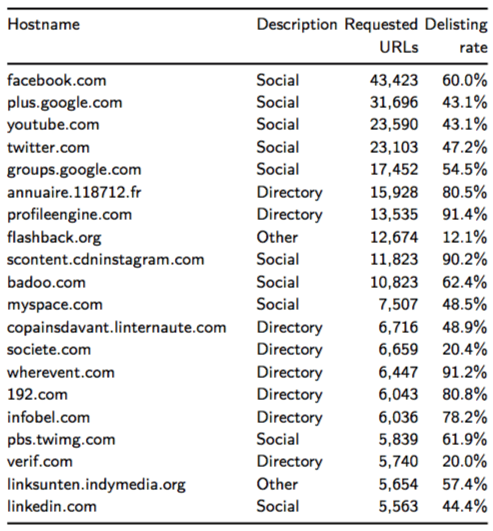Law and reputation firms generate 21% of Right to Be Forgotten delistings, says Google
New report from Google digs into three years' worth of data on removal requests and exposes the delisting criteria.
Google says that there are “tens of thousands” of Right to Be Forgotten (RTBF) requests filed each month in Europe. In a new blog post, the company explains that it’s updating its “Transparency Report,” which details RTBF requests, to include new categories of information.
In addition to reporting aggregate data on requests, their countries of origin and percentages granted, Google says it will now reveal:
- The type of individual/entity making the request: private vs. non-private (government entity, corporations, NGOs)
- What sort of content is associated with the request: personal information, professional information, criminal activity
- Whether the site on which the link appears is a directory site, news site, social media or other.
- Delisting rate by content category
Google is simultaneously releasing a report that provides more depth and detail on the nature of delisting requests, summarizing three years of data since RTBF first came into being in May 2014. The high-level findings are provided in an infographic in the blog post.
In the report, Google says there are “two dominant intents for RTBF delisting requests.” Roughly a third (33 percent) of requests are related to personal information on social media and directory sites. Another 20 percent relate to news and government websites that contain “a requester’s legal history.” The rest are diverse and span a range of content types and objectives.
Top hostnames for requested delistings
Source: Google “Three years of the Right to be Forgotten” (2018)
Google said that more than half (51 percent) of requests come from three countries: France, Germany and the UK. Overall, only 43 percent of requests are granted.
Private individuals make up most of those requesting delisting — Google says 85 percent in the report and 89 percent on the infographic. Non-private persons (entities, government officials) make up the rest. Minors make up 5 percent the private individual requester group.
The report is the first time Google provided significant detail on its RTBF evaluation process. Interestingly, the company said there’s no automation involved. Below are the major criteria and considerations, which I’ve paraphrased for length:
- The validity of the request . . . and the requester’s connection to an EU/EEA country.
- The identity of the requester . . . to assess whether the requester is a minor, politician, professional, or public figure.
- The content referenced by the URL: is it of interest to the public; how “sensitive” is the content and did the person requesting delisting consent to it being made public?
- The source: Google strongly implies that government and news sites are weighted more heavily (against delisting) compared with “a blog or forum.”
Breakdown of those requesting delisting
Source: Google “Three years of the Right to be Forgotten” (2018)
Google also reiterated and clarified the scope of delisting, if granted:
Delistings occur on result pages for queries containing a requester’s name on (1) Google’s European country search services; and (2) on all country search services, including google.com, for queries performed from geolocations that match the requestor’s country. However, in 2015 the French data privacy regulator CNIL notified Google to extend the scope of delisted URLs globally, not just within Europe. Google appealed this decision, and the matter is now under consideration by the Court of Justice of the European Union.
One of the more interesting disclosures in the report is that there is a category of high-volume RTBF requesters. Google reports that the top 1000 requesters “generated 14.6 percent of requests and 20.8 percent of delistings. These mostly included law firms and reputation management agencies, as well as some requesters with a sizable online presence.”
Categories of information associated with delisting requests
Source: Google “Three years of the Right to be Forgotten” (2018)
The full report is available for download here.
Contributing authors are invited to create content for Search Engine Land and are chosen for their expertise and contribution to the search community. Our contributors work under the oversight of the editorial staff and contributions are checked for quality and relevance to our readers. Search Engine Land is owned by Semrush. Contributor was not asked to make any direct or indirect mentions of Semrush. The opinions they express are their own.






